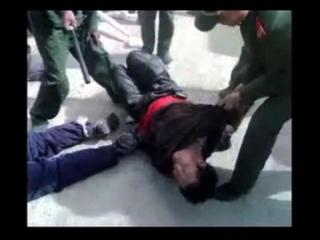Tibetans attack police station, 93 monks arrested
BEIJING – Hundreds of Tibetans attacked a police station and government officials in northwestern China despite heightened security, prompting the arrests Sunday of nearly 100 monks, state media reported.
Six of those arrested for alleged involvement in the attack were caught by police while 89 others turned themselves in, according to the official Xinhua News Agency. All but two were monks, it said.
The protest appeared to be in response to the disappearance of a Tibetan who escaped from police custody in Qinghai province, Xinhua said.
According to a Tibetan exile, the protest involved as many as 2,000 people and was sparked by the apparent suicide of a monk being investigated for unfurling a Tibetan flag.
Xinhua said several hundred people — including nearly 100 monks from the Ragya Monastery — attacked the police station in Ragya, a township in the Tibetan prefecture of Golog, on Saturday, assaulting policemen and government staff.
Some officials were injured slightly in the assault, Xinhua said, without elaborating.
A man who answered the phone at Qinghai's public security department said he had not heard about the attack or the arrests. Phone calls to other police departments and government offices in the area rang unanswered.
The violence is the latest known incidence of unrest following a bomb explosion Monday in an unoccupied police station in predominantly Tibetan Ganzi prefecture in Sichuan province. The explosion shattered the building's windows but no injuries were reported.
In February, Tibetan advocacy groups said a thousand monks gathered at a monastery in Sichuan province's Aba county to protest a ban on celebrating a traditional prayer festival called Monlam. One monk doused himself with gasoline and set himself ablaze.
The violence on Saturday began after a man accused of supporting Tibetan independence escaped from police custody and went missing, Xinhua said.
It cited authorities as saying the man fled from the Ragya police station after asking to go to the washroom, prompting a manhunt. It cited a witness as saying he was seen swimming in the Yellow River.
A former resident of the area who now lives in Dharmsala, India, said the protesters were angry because they believed the man, a 28-year-old monk named Tashi Sangpo, jumped in the river to commit suicide after fleeing.
"When Tashi was being interrogated by the officials, he asked their permission to go to the toilet. He then went out and jumped into the Yellow River," the source said on condition of anonymity, citing fear of reprisals against his family still living in China. "The dead body is yet to be found."
The exile, who said he received the information from people in Ragya, said 500 monks from the monastery protested outside the local administration office and the group swelled to about 2,000 as others from the village joined.
He said Tashi Sangpo was being investigated by police because he unfurled a Tibetan flag on the roof of the monastery on March 10, the anniversary of the start of a 1959 abortive Tibetan revolt against Chinese rule, and distributed pamphlets on the street urging unified protests against Chinese rule. The Tibetan flag is banned in China.
It was difficult to independently verify the account because government departments could not be reached Sunday. Communication is also spotty in the areas and residents usually will not talk for fear of official retaliation.
Dharmsala is the seat of the Dalai Lama's self-proclaimed government-in-exile and the destination of many Tibetans who flee China.
Security in Tibetan areas has been tightened in recent weeks as Beijing tried to head off trouble ahead of sensitive anniversaries this month. March 14 marked the one-year anniversary of anti-government riots in Lhasa, Tibet's regional capital, while March 17 marked 50 years since the Dalai Lama escaped into exile in India after Chinese troops crushed the Tibetan revolt.
China claims Tibet has always been part of its territory, but many Tibetans say the Himalayan region was virtually independent for centuries and that Beijing's tight control is draining them of their culture and identity.
___
Associated Press writer Ashwini Bhatia in Dharmsala, India, contributed to this report.




No comments:
Post a Comment